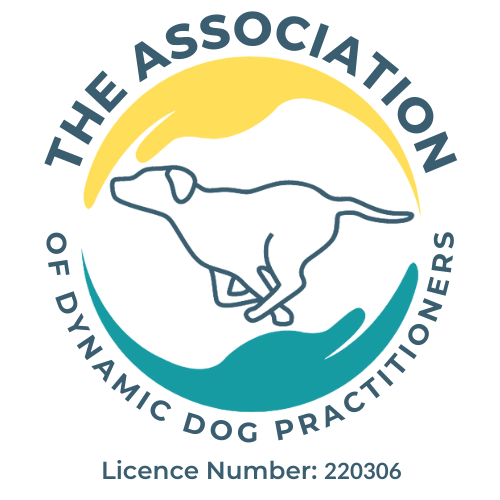
A Dynamic Dog consultation is very different from most canine behavioural assessments.
ALL aspects of both you and your dogs day to day life are taken into consideration from their behaviour, to what they eat, to the way they move, sleep, poop, play and their daily routine.
Working with a sound knowledge of the inner structures and systems of the dog, we understand the impact that emotional and physical health may have on a dogs behaviour. Everything is connected, and that is why we insist on a FULL and DETAILED assessment when working with you & your dog.
Many factors can influence a dog's behaviour including their environment, daily routine, their emotions and their physical health.
Everything is interconnected and it is essential that all aspects are considered when working with clients and their dogs who have behavioural issues.
Be warned we want to know EVERYTHING which often leads us down previously unexplored territory.
Prices from £200 (payment plans available)
I offer a 5% discount for NHS

What might be going on for your dog?
Is your dog chewing everything in sight? Or barking up a storm and getting in a tizz?
You might be surprised to learn that these behaviours are commonly linked to physical pain or discomfort.
Chewing releases endorphins which help your dog to self-soothe, which is why your dog is chewing everything or eating things they shouldn’t! When your dog is feeling compromised, they can often overreact by barking, lunging, or guarding because they feel vulnerable.
Pain plays an important role in problem behaviour ranging from separation anxiety, resource guarding, reactivity, pica (eating non-food items) and compulsive disorders, all of which can be rooted in pain.
Signs of pain in dogs
Recent research strongly suggests that there is a correlation between pain in dogs and problem behaviours and being nonverbal, dog's cannot self-report the presence of pain. It is now accepted that the most accurate method for evaluating pain in dogs is not by physiological parameters but by observations of behaviour.
If your dog’s behaviour has suddenly changed or deteriorated, it’s essential to explore through a thorough assessment of whether there is pain involved alongside managing and training new behaviours. Some signs could be:
- Excessive chewing and licking
- Aggressive or possessive behaviour
- Compulsive behaviours (spinning, licking the air, incessant or rhythmic barking, fly snapping or chasing unseen objects, freezing and staring, polydipsia (excessive drinking), sucking, licking, or chewing on objects (or owners).
- Changes in eating, drinking or sleeping habits
- Noise sensitivity
- Increased barking or vocalisation
- Intermittent or continuous lameness or limping
- Changes in posture or gait
- Reluctance to walk or jump on and off furniture
- Excessive itching
- Difficulty settling
- Growling when you ask them to move
- Separation Anxiety
- Sudden changes in behaviour
This list is not exhaustive, if unsure please contact me.
What is involved in an assessment:
60-90-Minute Consultation
Lasting approximately 90 mins, we will delve deeper taking look at what life is like for you and your dog. Be warned I want to know EVERYTHING which often leads us down previously unexplored territory.
Collecting the Data
This is the most important part; I need to gather as much information from the videos and photos that you supply. It is important to gather images of your dog just going about its daily routine. There may be various activities that will need to be captured as evidence in the form of either video/photos or both.
If local, I will be able to complete the core videos; that said, images will still need to be supplied by you of your dog going about their daily life.
Data Review
I then spent time going over all the data and information given to me in the consult so I can build the full picture of what is going on for your dog.
Veterinary Report & Liaison
I create a thorough veterinary report with corresponding evidence and liaise with you and your dog’s vet, where I discuss my findings, ensuring that any underlying issues are diagnosed and supported so that your dog may get the relevant treatment and care.
Behaviour Management Plan
This may be a short term to help you micro manage behaviour whilst additional Veterinary support is given or longer term help can be discussed depending on assessment outcomes. Either way we make sure you have full support during the initial Dynamic Dog Assessment.
Why is pain the name of the game?
It's not always a limp or a whine! Pain related behaviour is extremely complex. Dogs don't often show that they are in discomfort in ways we would usually expect, it is often subtle and goes unnoticed for weeks, months and even years!
In a recent study carried out in Lincoln University by Daniel Mills, it was found that approximately 80% of dogs that presented with behavioural issues had some form of undiagnosed pain that was a direct cause or adding to a problematic behaviour. https://www.mdpi.com/2076-2615/10/2/318
A Dynamic Dog Practitioner has been taught the skills to confidently spot potential signs of discomfort and relay them to the vet so that you and your dog find relief sooner, whilst simultaneously helping you manage your dogs behaviour.
Why wait for your dog to go lame, before you consider they are in pain?
ACCREDITATION
Dynamic Dog Practitioners are exclusively certified by All About the Dog Therapy - an approved UK Rural Skills provider. For more information about the course or to verify my accreditation, go to: https://www.dynamicdog.co.uk/about



